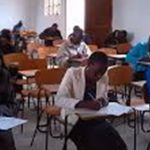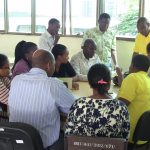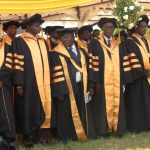Bachelor of Science in Information, Communication and Technology
The emergence of Information and Communication Technologies (ICT) sector as one of the main supports of the Tanzanian economy has created the need for more of ICT professionals with a strong computing background. These professionals should not only fit into mainstream ICT fields but also have the ability to exploit opportunities that new technologies offer. Furthermore, companies/organisations require professionals who are not only technically competent but who also have the ability to exploit the
opportunities offered by new management approaches.
In order to address the above situation, the B.Sc. Information and Communication Technology programme is aimed at producing graduates with a thorough understanding of computer-based systems. It covers a range of areas including software design and development, multimedia, web-based technologies, computer networks, information security and Information and Communication Technology planning and management. Its main aim is to give students a broader knowledge of the areas that they are likely to come into contact with in the working environment. Graduates of this Programme are expected to find a range of attractive career opportunities ranging from software development, multimedia and web-based software development to network design
Programme Summary
Programme Informations
Enter Qualification
Option (I): Direct Entry Scheme (Form VI) Qualifications
- Possession of Certificate of Secondary Education Examination (CSEE) or equivalent, with passes in four (4) approved subjects, obtained prior to sitting for the Advanced Certificate of Secondary Education Examination (ACSEE) or equivalent; and
- He/she has obtained at least two principal passes with a total of 4.0 points in any science subjects including: Physics, Chemistry, Biology, Mathematics, Geography, Economics or Agriculture in the Advanced Certificate of Secondary Education Examination (ACSEE)
Option (II) Equivalent Qualifications
- Possession of second class Diploma in Information and Communication Technology, Information Technology, Computer Science, Computer Engineering, Electronics, Computing and Information Communication, Computer Networks, Laboratory Technology, Telecommunications Engineering, Electronics and Communicating Engineering, Statistics, Library Information System, or any other relevant science Diploma recognized by OUT Senate with an average of ‘B’ or GPA of 3.0
- OR Interested first degree holders from other discipline, with Mathematics as a subsidiary.
There are a total of 39 courses in BSc ICT. Students are required to take all core courses in level 1, 2 and 3, which make up to 380 credits. To graduate with 400 credits, the students must take any of the optional courses in 2nd or 3rd year. The courses and their details are presented in the following table below:
Bachelor of Science Information and Communication Technology (BSc ICT)
Level of study | Course code | No of credits |
Level 1 |
|
|
Fundamentals of InformationSystems | OIT 131 | 10 |
Discreet Mathematics with Applications | OIT 132 | 10 |
Probability and Statistics | OIT 133 | 10 |
Communication Skills for IT | OIT 134 | 10 |
Computer Architecture | OIT 135 | 20 |
Programming in C | OIT 136 | 20 |
Data Communications and Networking | OIT 137 | 10 |
Database Design and Implementation | OIT 138 | 20 |
Industrial Training 1 | OIT 139 | 20 |
Level 2 |
|
|
Operating Systems | OIT 231 | 20 |
Systems Analysis and Design | OIT 232 | 20 |
Inventory Models and Queuing Theory | OIT 233 | 10 |
Object Oriented Programming with JAVA | OIT 234 | 20 |
Wireless Networks and Mobile Computing | OIT 235 | 20 |
Computer Security | OIT 236 | 10 |
Data Mining Techniques and Application | ODM 212 | 20 |
Web Programming | OIT 237 | 10 |
Fundamentals of GIS | ODM 207 | 20 |
Industrial Training II | OIT 238 | 20 |
Level 3 |
|
|
Information Systems Management | OIT 331 | 10 |
Network Design and Administration | OIT 332 | 10 |
Computer Ethics and Social Cultural Implication | OIT 333 | 10 |
Cross cutting issues | ODM 209 | 10 |
E-Commerce and Entrepreneurship | ODM 211 | 10 |
Final Year Project | OIT 334 | 30 |
Elective Courses |
|
|
Multimedia Technologies | ODM 301 | 10 |
Graphics Processing & Human Computer Interaction | ODM 201 | 10 |
Programming in C++ | OIT 335 | 10 |
Enterprise Resource Planning (ERP) Systems | ODM 204 | 20 |
Total |
| 430 |
Tuition fee for BSc ICT is paid TShs 90,000/= (USD 60 for SADC/EAC and USD 120 for Non SADC) per unit for all courses except Industrial Training and Final Year Project which cost TShs 100,000/= per unit
Name: Mathias Ombeni
Email: mathias.ombeni@out.ac.tz
At the end of the programme, graduates will have acquired adequate skills to plan, design, implement and manage information systems.
Mode of Assessment: All courses shall be examined during the academic year in which they are studied as per the General University (OUT) Examinations regulations for undergraduate courses. The assessment shall consist of continuous assessment (demonstrations and main timed tests) and a written final examination. The weighting is as follows:
For courses with no practical demonstrations, the continuous assessment composition shall be main timed test 30% and final examination 70%.
For courses with practical demonstrations, the continuous assessment composition shall be practical demonstrations 20%, main timed test 30% and final examination 50%.
- Timed tests: There shall be one main timed test.
- Final Examinations: Final examinations for each academic year of study.



